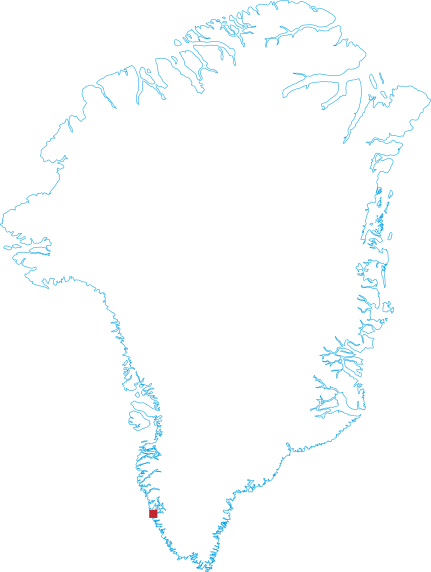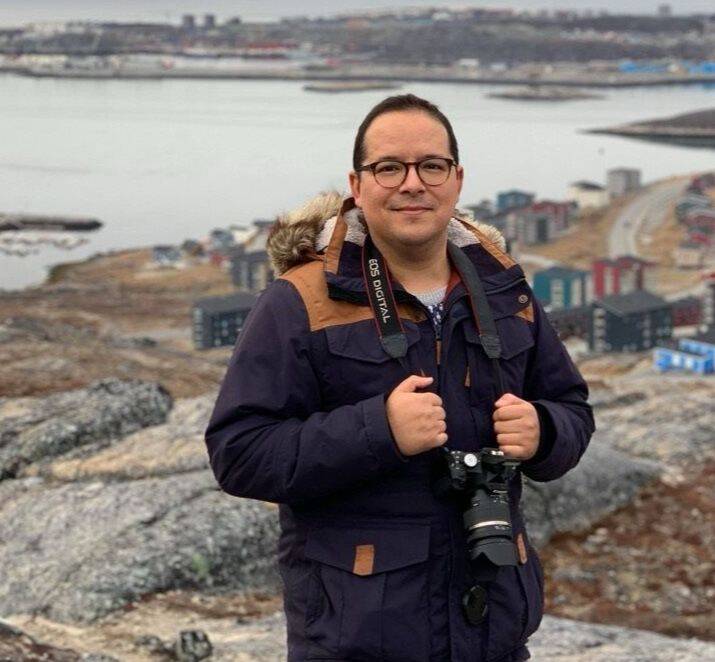
JAVIER ARNAUT


PHOTO: ANP / DIETMAR DENGER / LAIF AGENTUR
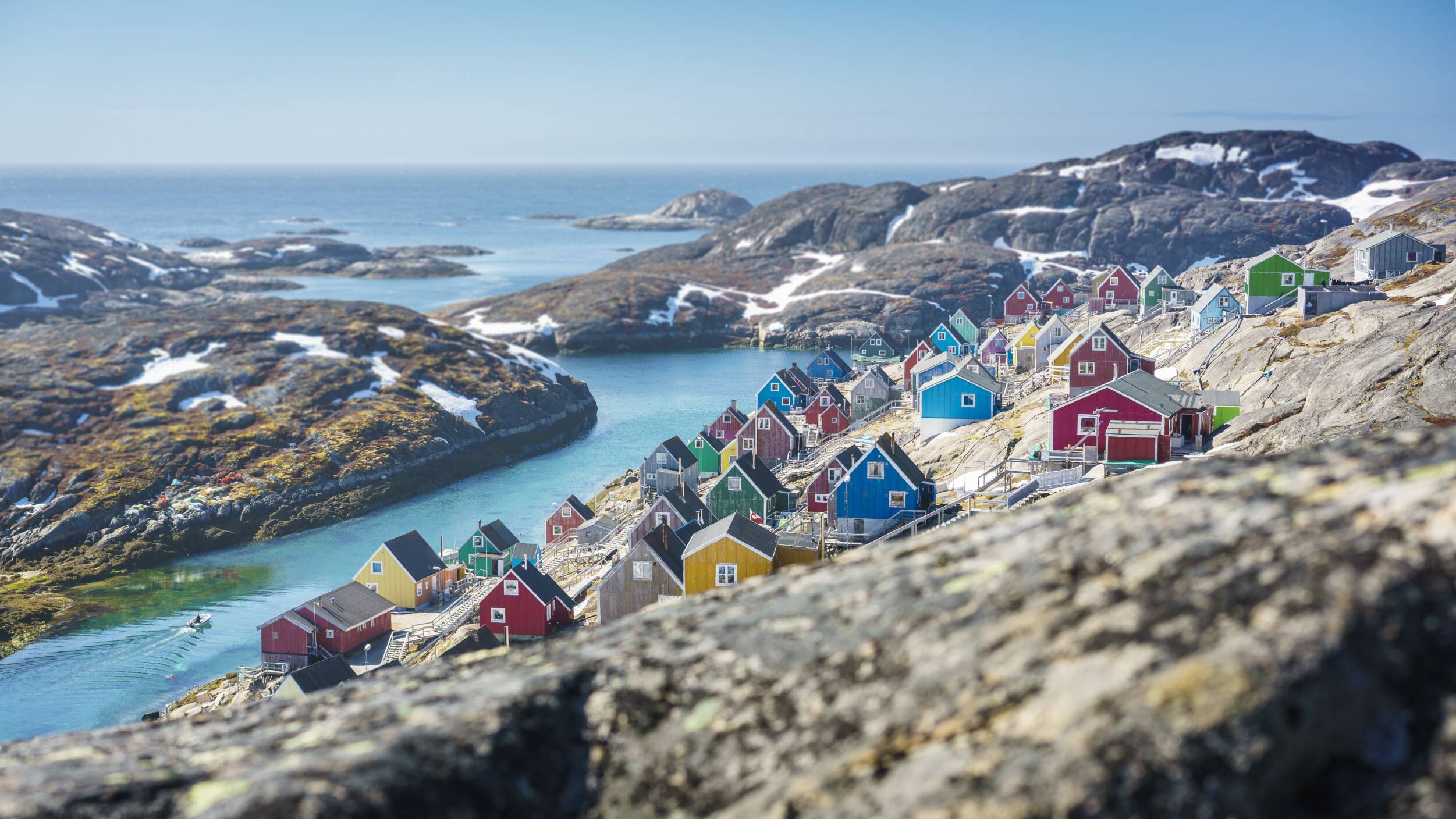
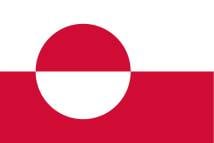
PROPOSITION
Veridianna Camilo Pattini – Faculteit Medische Wetenschappen
The desire to arrive early will strip away the beauty of the journey.
NUUK
READING TIME: 2 MINUTES
TEXT: JURGEN TIEKSTRA
GREENLAND
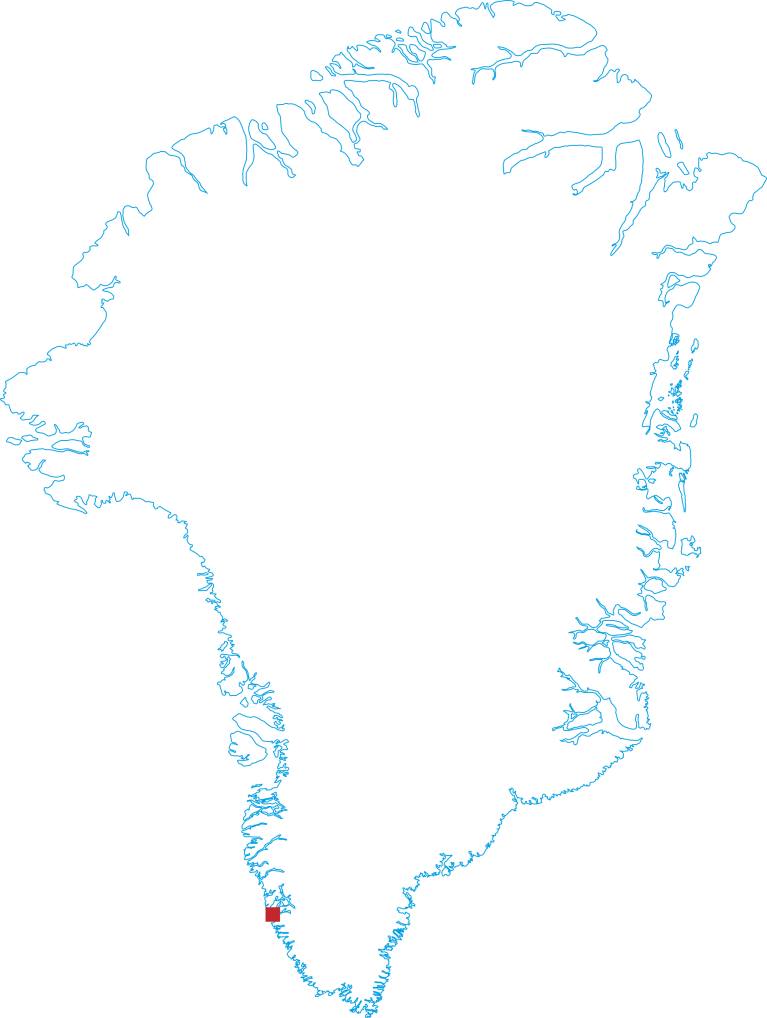
Javier Arnaut is in a hotel in Reykjavík, Iceland. He had to go to Scotland for work but is stranded here because of bad weather. ‘Flying in the Arctic area is always unpredictable. Actually, you should always plan for two extra days.’ Now, he is waiting for the wind to calm down so he can return to his apartment in the district of Qinngorput, Nuuk, the smallest capital in the world on the largest island in the world: Greenland.
Remains of the last ice age
Arnaut grew up on the Mexican peninsula of Baja California. The differences between the two countries are immense. His motherland has over 130 million inhabitants on a surface that is a little smaller than Greenland. No more than 58,000 people live in Greenland, with about 20,000 of them in Nuuk on the west coast. Over 80% of the island is covered by an ice sheet, a remnant of the last ice age. Only the coast is inhabited, with small, isolated cities that are not reachable by car from one another.
Attractively authentic
‘After receiving my PhD in Groningen in 2017, I was looking for opportunities outside of the Netherlands,’ Arnaut says about his emigration to Greenland. ‘I was in Poland for a while, but as the salaries were very low, I was looking for a better job. I received offers from Germany and Greenland. First, I went to check out Greenland; they paid for my accommodation and other expenses. Arriving in Greenland was breathtaking. It was like landing on the moon: no trees, everything was white. I found the people very interesting: they are spontaneous and interested in foreigners. They start a conversation even if they don’t know you. I appreciate the authenticity of the people, without trying to conform to others.’
Economic history
Arnaut came to Groningen at one point because he wanted to specialize in economic history, a field for which the University of Groningen is renowned. That is because of the work of the British economist Angus Maddison, who, starting in the seventies, conducted extensive quantitative historical research in Groningen, which is still being expanded upon today.
‘It’s thanks to Groningen that I’m in Greenland now, as the Greenlanders saw my CV and thought: we need an economist with an international view on economic development.’
Sole economist in Greenland
In fact, thanks to Groningen, Javier Arnaut ended up in the heart of Greenland’s politics. He was offered an appointment at the University of Greenland and a seat on the government's economic advisory council. ‘I am the only economist in the country, can you imagine? There are other economists on the advisory council, but they live in Denmark, not here.’
Trump
Arnaut says that his unique position was the reason he received forty interview requests to address the statements made by newly elected American president Donald Trump about taking Greenland from Denmark. ‘It was somewhat overwhelming: radio stations from Argentina, Mexico, the USA, the EU – they all wanted to hear what the Greenlanders thought of Trump’s statements.’
Colonialism
This front-page news fits Arnaut’s research like a glove: the economic development of the Arctic region and colonialism. The US-Greenland relationship dates back decades: the US has had a military base on the island since the beginning of the Cold War. Nowadays, there is widespread interest in Greenland’ rare metals, including from China.
Degradation of nature
This is a dilemma for Greenlanders, Arnaut says. Politically, there is a strong desire for independence from Denmark on the island. But for now, the country cannot do without the
€ 600 million the Danish send every year. Greenland’s economy is extremely one-sided: people live from fishing or the government. The extraction of raw materials can be a way out, but carries the risk of degradation of nature, among other consequences. This question has not yet been answered.
Mental challenge
The day after the interview, Javier Arnaut hopes to be back in Nuuk, on his balcony overlooking a bay. It is only March, one of the worst months in terms of weather, he says. The weather only improves at the end of May, early June. That’s why life is isolated, even in the capital.
Newcomers to Greenland have to rise to that mental challenge, Arnaut explains. ‘At the same time, it offers opportunities to reinvent yourself. We tend to spend a lot of time avoiding our inner demons by travelling or going to parties. But in Greenland, you need to look the silence in the eye. I advise people to experience this to get in touch with nature and with themselves.’
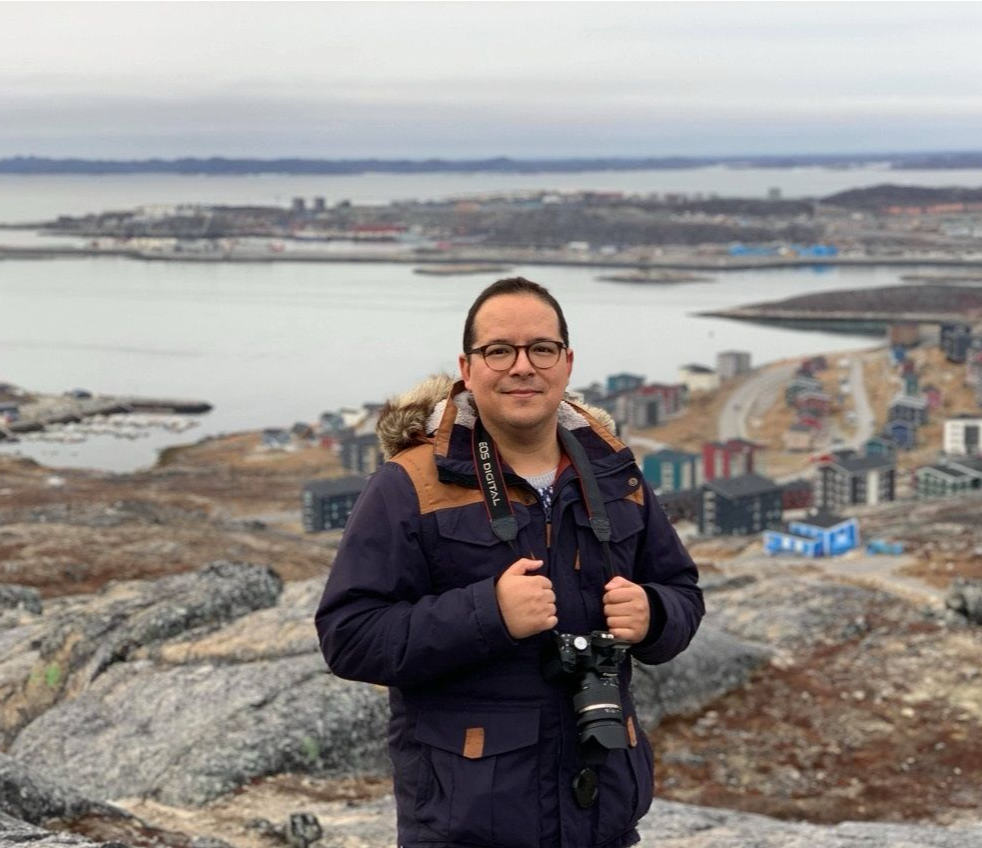



PHOTO: ANP / DIETMAR DENGER / LAIF AGENTUR
JAVIER ARNAUT
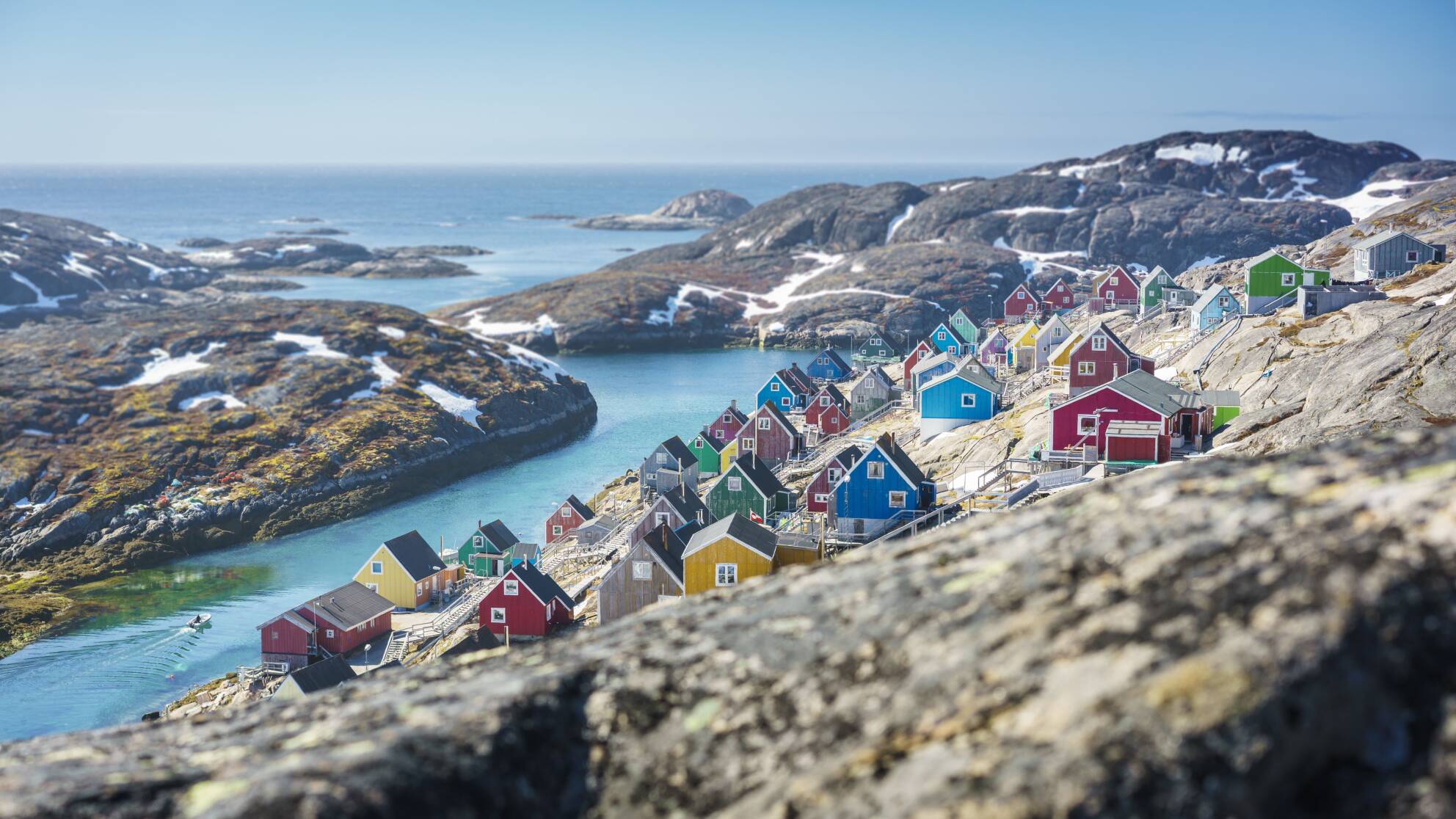
PROPOSITION
Veridianna Camilo Pattini – Faculteit Medische Wetenschappen
The desire to arrive early will strip away the beauty of the journey.
Javier Arnaut is in a hotel in Reykjavík, Iceland. He had to go to Scotland for work but is stranded here because of bad weather. ‘Flying in the Arctic area is always unpredictable. Actually, you should always plan for two extra days.’ Now, he is waiting for the wind to calm down so he can return to his apartment in the district of Qinngorput, Nuuk, the smallest capital in the world on the largest island in the world: Greenland.
Remains of the last ice age
Arnaut grew up on the Mexican peninsula of Baja California. The differences between the two countries are immense. His motherland has over 130 million inhabitants on a surface that is a little smaller than Greenland. No more than 58,000 people live in Greenland, with about 20,000 of them in Nuuk on the west coast. Over 80% of the island is covered by an ice sheet, a remnant of the last ice age. Only the coast is inhabited, with small, isolated cities that are not reachable by car from one another.
Attractively authentic
‘After receiving my PhD in Groningen in 2017, I was looking for opportunities outside of the Netherlands,’ Arnaut says about his emigration to Greenland. ‘I was in Poland for a while, but as the salaries were very low, I was looking for a better job. I received offers from Germany and Greenland. First, I went to check out Greenland; they paid for my accommodation and other expenses. Arriving in Greenland was breathtaking. It was like landing on the moon: no trees, everything was white. I found the people very interesting: they are spontaneous and interested in foreigners. They start a conversation even if they don’t know you. I appreciate the authenticity of the people, without trying to conform to others.’
Economic history
Arnaut came to Groningen at one point because he wanted to specialize in economic history, a field for which the University of Groningen is renowned. That is because of the work of the British economist Angus Maddison, who, starting in the seventies, conducted extensive quantitative historical research in Groningen, which is still being expanded upon today.
‘It’s thanks to Groningen that I’m in Greenland now, as the Greenlanders saw my CV and thought: we need an economist with an international view on economic development.’
Sole economist in Greenland
In fact, thanks to Groningen, Javier Arnaut ended up in the heart of Greenland’s politics. He was offered an appointment at the University of Greenland and a seat on the government's economic advisory council. ‘I am the only economist in the country, can you imagine? There are other economists on the advisory council, but they live in Denmark, not here.’
Trump
Arnaut says that his unique position was the reason he received forty interview requests to address the statements made by newly elected American president Donald Trump about taking Greenland from Denmark. ‘It was somewhat overwhelming: radio stations from Argentina, Mexico, the USA, the EU – they all wanted to hear what the Greenlanders thought of Trump’s statements.’
Colonialism
This front-page news fits Arnaut’s research like a glove: the economic development of the Arctic region and colonialism. The US-Greenland relationship dates back decades: the US has had a military base on the island since the beginning of the Cold War. Nowadays, there is widespread interest in Greenland’ rare metals, including from China.
Degradation of nature
This is a dilemma for Greenlanders, Arnaut says. Politically, there is a strong desire for independence from Denmark on the island. But for now, the country cannot do without the € 600 million the Danish send every year. Greenland’s economy is extremely one-sided: people live from fishing or the government. The extraction of raw materials can be a way out, but carries the risk of degradation of nature, among other consequences. This question has not yet been answered.
Mental challenge
The day after the interview, Javier Arnaut hopes to be back in Nuuk, on his balcony overlooking a bay. It is only March, one of the worst months in terms of weather, he says. The weather only improves at the end of May, early June. That’s why life is isolated, even in the capital.
Newcomers to Greenland have to rise to that mental challenge, Arnaut explains. ‘At the same time, it offers opportunities to reinvent yourself. We tend to spend a lot of time avoiding our inner demons by travelling or going to parties. But in Greenland, you need to look the silence in the eye. I advise people to experience this to get in touch with nature and with themselves.’
READING TIME: 2 MINUTES
TEXT: JURGEN TIEKSTRA
GREENLAND

NUUK
